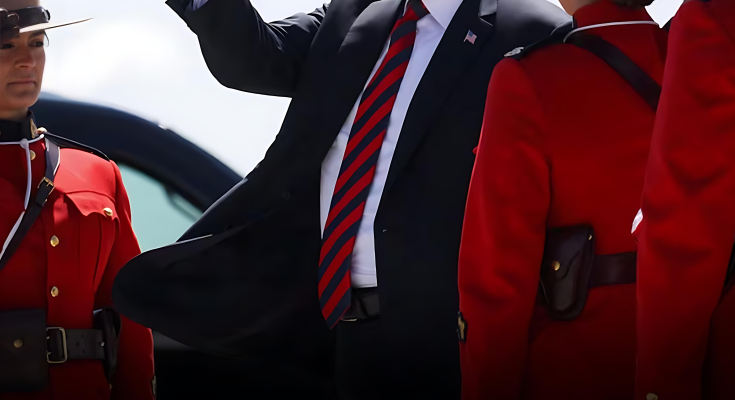In a legal question that’s now igniting headlines, drawing in legal scholars, and quietly unsettling diplomatic circles, people are asking: Can former President Donald J. Trump legally enter Canada if convicted of a crime?
The question may sound hypothetical — but with ongoing criminal cases still looming over Trump in various jurisdictions, the possibility is becoming more real by the day, and the implications are seismic.
“If convicted, Trump could technically fall under Canada’s inadmissibility rules,” said one international law expert. “And if enforced, it would be the first time in modern history a U.S. president — former or current — could be denied entry to a neighboring ally.”
🚧 Canada’s Strict Border Policy: No Exceptions?
Under Canada’s immigration laws, foreign nationals with a criminal conviction — particularly for offenses considered indictable — can be deemed inadmissible, regardless of fame or political status.
While Canadian officials have the discretion to grant waivers or temporary resident permits, the law itself makes no formal distinction for heads of state or high-profile public figures.
“Even celebrities like Chris Brown, The Game, and others have been denied entry due to criminal records,” said one immigration attorney. “The law doesn’t care about headlines.”
If Trump were to be convicted of felony-level offenses, even outside of violent crime categories, technically he could be barred from entering Canada unless special diplomatic or ministerial exceptions were granted.
🌐 Legal vs. Political: Where the Real Conflict Begins
This isn’t just a legal debate — it’s a political powder keg. If Canada were to deny Trump entry based on criminal grounds, it would set a historic precedent, potentially straining U.S.–Canada relations and triggering political backlash from Trump’s supporters and global observers alike.
“What happens if a former U.S. president is stopped at the Canadian border?” one policy analyst asked. “This isn’t just legal — it’s symbolic.”
Such a move could spark a major international conversation about how democratic nations handle controversial political figures post-leadership, and what it means for diplomatic immunity, sovereignty, and border equality.
💬 The Public Reacts
Unsurprisingly, the internet is on fire with reactions:
- “If regular citizens can be denied entry for a DUI, why not Trump?”
- “He’s a former president! Canada would NEVER block him.”
- “This would cause a global media circus and a constitutional headache.”
Hashtags like #TrumpTravelBan, #CanadaBorderDebate, and #PresidentialImmunity are trending across X (formerly Twitter) and TikTok, as users passionately weigh in on what many are calling an unprecedented test of international fairness.
🤔 What Happens Next?
For now, the question remains hypothetical — Trump has not been convicted of any crime that would trigger automatic inadmissibility.
But experts say that if such a conviction were to occur, Canada would face a delicate and highly scrutinized decision: Uphold their laws without bias, or make a political exception for one of the most controversial figures in modern history.
📌 Final Word
This is more than a border question — it’s a global moment in the making.
If former President Trump is convicted and seeks entry to Canada, it will force the world to ask:
Do borders protect policy, or do they bow to power?



